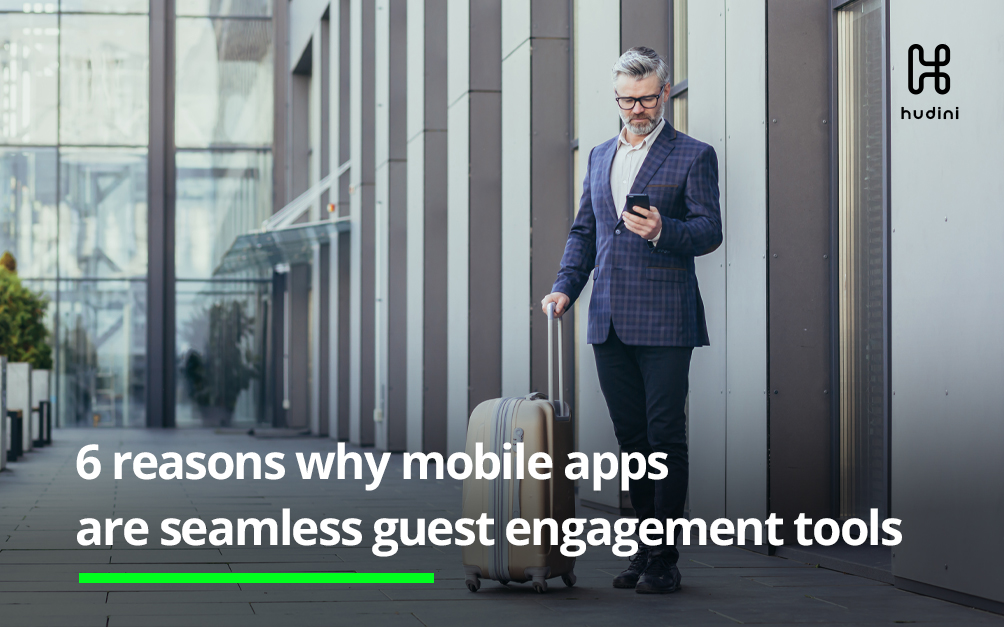
6 reasons why mobile apps are seamless guest engagement tools
- Hudini
Hotels that are looking for tech-enabled ways to improve guest engagement and experience put mobile apps at the top of their lists. And with good reason. While mobile apps require guests to install them on their phones or tablets, they can enhance every aspect of a hotel stay and create a more connected experience.
The app interacts with the operating system of the mobile device, linking up with GPS and the internet to offer a wider range of functionalities and make the guest’s stay more convenient.
Guest-facing mobile apps like Hudini connect every step of the guest journey from check-in to check-out, enabling guests to place F&B orders and service requests, browse products and make payments. Here’s the full list of what guests can do using hotel apps powered by Hudini:
- Check-in online and skip the front desk
- Choose from personalized upgrades
- Use the app as a convenient and secure digital room key
- Look up real-time hotel information and city guides
- Adjust the room’s temperature, lighting and curtains
- Browse digital menus and personalize in-room dining orders
- Schedule housekeeping
- Stream their own OTT content on the room’s IPTV
- Make payments for any purchase or service
- Leave feedback
- Collect points as part of the hotel’s loyalty program
- View their bills prior to check-out
Guest-facing mobile apps promote better and more personalized interactions between the hotel and its guests. They also enjoy unique advantages when compared to other platforms.
- Uninterrupted user sessions
Once a guest logs into the app, he can continue to use it for everything from checking-in to checking-out, without having to sign in for every session. His details and preferences are stored and factored into every interaction.For example, let’s say he’d ordered a vegan sandwich via the app upon arrival. This preference is recorded on the app and vegan options are prioritized when he places orders for room service. - Greater personalization
The mobile app connects data islands from different hotel systems to create a more comprehensive profile for each guest. This is augmented with data from every app session. Data is then utilized to create a more bespoke experience for the guest.
A business traveler will see suggestions that make his day more productive, such as an early check-in, access to the business lounge, and pre-ordered meals. A honeymooning couple, on the other hand, will enjoy curated moments that make their celebration more memorable, such as a private dinner custom-made by the head chef. - Ideal for repeat guests
Regular guests can use the mobile app every time they stay at the hotel, and pick up from where they left off during their previous stay. They can stay in their favorite room, order their usual dinner with a few clicks, create an appointment for their favorite spa session or book their regular table at the restaurant. The intuitive features of the hotel app can make guests feel right at home.
- Better engagement for hotels
The Hudini hotel app is visually-rich and easy to browse, leading to guests spending a significant amount of time exploring hotel information, F&B menus, amenities and activities. The guest experience app at Atlantis, The Palm in Dubai is powered by Hudini, and has an average user session of 28 minutes. This gives hotels more time to interact with guests, showcase offerings that might interest them and increase earnings per room
- Regular notifications
If guests enable app notifications, they can be automatically updated about events and offers. Imagine that the check-out time for one of your guests is approaching. If her room has not been booked by an incoming guest, you could push a notification through the hotel app asking if she’s interested in a late check-out for a small additional fee. There’s a good chance that the guest wanted the late check-out, and a timely notification encouraged her to extend her stay and helped the hotel make more revenue.
- Loyalty program integration
The Hudini hotel app can be linked to the hotel’s loyalty program, earning guests points for every purchase made or service initiated via the app. This includes F&B orders, laundry services, room upgrades, spa bookings and restaurant reservations, as well as shopping. These points are incentives for guests to visit again. Atlantis, The Palm, for example, had integrated its loyalty benefits with the Hudini app and reported a 30% guest retention rate this year.
Hotels can make the most of mobile apps through constant maintenance and updates. By following the best security and privacy protocols, they can assure guests that their data is safe and can only be used by the hotel to enhance their stay. Like any technology, mobile apps have their merits and challenges. However, for hotels that want to stay ahead of the game, guest-facing mobile apps are irreplaceable.
Engage, Elevate.

Join our mailing list
Enter your email address


